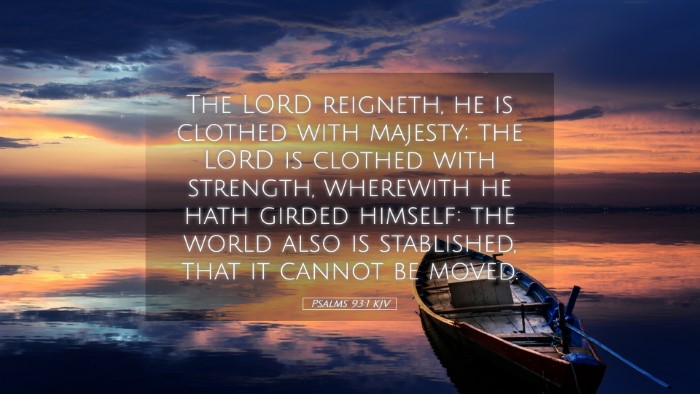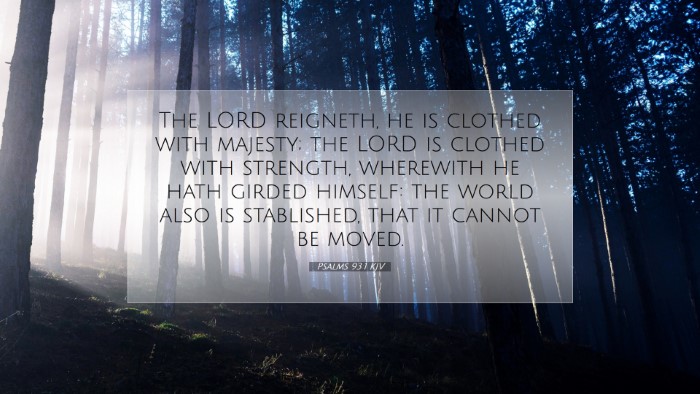Commentary on Psalms 93:1
Psalms 93:1 states:
"The LORD reigneth, he is clothed with majesty; the LORD is clothed with strength, wherewith he hath girded himself: the world also is established, that it cannot be moved."
Introduction
This verse serves as a powerful proclamation of the sovereignty of God over the earth and the recognition of His majesty and strength. Each phrase encapsulates vital doctrinal truths important for understanding the character of God and His relationship with creation.
The Sovereignty of God
Matthew Henry emphasizes the supreme dominion of God, expressing that “The Lord reigneth” signifies God’s providential governance over all creation. This sovereignty is not only a future promise but is a present reality that provides reassurance to believers.
Albert Barnes notes that the declaration of God's reign brings both comfort and authority. It insists that despite the apparent chaos in the world, God remains in control. This linchpin of theological understanding inspires confidence in His plans and purposes.
The Majesty of God
The phrase “he is clothed with majesty” points to God’s exalted state. Adam Clarke interprets majesty as both an outward expression of royal glory and an intrinsic quality reflecting God’s nature. The image of God being clothed suggests that His majesty is evident and tangible, observable in His creation.
Majesty signifies the grandeur and dignity of God, which commands our respect and reverence. This concept further correlates with the worship of God, as noted by Henry, who encourages the faithful to approach God with an understanding of His greatness.
The Strength of God
“The LORD is clothed with strength” signifies the inherent power of God. Barnes comments that this strength is not merely physical but encompasses the moral and spiritual power that sustains the universe. God’s strength enables Him to govern and protect His creation effectively.
This strength is a source of comfort for believers, reminding them that their God is capable of defending, sustaining, and delivering them from adversities. Clarke elaborates that the girding of God with strength implies readiness for action and an unwavering commitment to His creation’s welfare.
The Stability of Creation
The latter part of the verse states, “the world also is established, that it cannot be moved.” This declaration conveys the stability and permanence of God’s creation under His sovereign hand. Henry expresses that the world’s establishment is a direct result of God’s reign, ensuring stability amid turmoil.
Barnes notes that this is a profound theological assertion, implying that the natural order and laws are governed by divine authority. The phrase “cannot be moved” emphasizes that while earthly institutions may change or falter, the created order remains under God's omnipotent oversight.
Theological Implications
This verse encapsulates the core attributes of God—sovereignty, majesty, and strength—and provides a foundation for understanding other truths about God and His creation. It speaks to issues of trust, stability, and assurance in times of crisis.
- Sovereignty: God’s control over history and nations affirms that no power exists outside His command.
- Majesty: Recognition of God’s glory leads to worship and an understanding of humanity’s place in relation to the Divine.
- Strength: Assurance in God’s power fosters faith in His ability to intervene in personal and communal crises.
Conclusion
In summary, Psalms 93:1 offers profound insights into the nature of God and His relationship to the world. It serves as a reminder for pastors, students, theologians, and scholars alike of the importance of acknowledging God's majesty, strength, and sovereign rule. As believers reflect on this verse, they are called to worship, trust, and proclaim the reign of the Lord in both personal and communal contexts.
This sentiment echoes through history and remains relevant as individuals seek to navigate the complexities of life in light of the enduring truths presented in Scripture.


